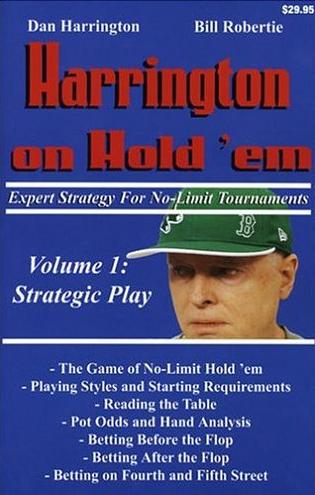|
|

July the 15th of 2007.
This is the first of a three books serie wirtten by Dan HARRINGTON.
The goal of the three books is to describe how a professional poker player play a no limit hold'em tournament. The first volume, HARRINGTON On Hold'em Volume I: Strategic Play (HoH Vol I) deals with the early and middle rounds of a tournament, when blinds are still somewhat small compared to stacks. Volume II tackles with the late rounds. The third volume is a serie of exercises that will test your understanding of what you've been taught in the first two books.
Even if the books deal with tournament poker, I would advise any player to read HoH Vol I. As a matter of fact:
=>As HoH Vol I deals with the early/middle rounds of tournaments, blinds are small enough compared to stacks so that the situations are comparable to cash games hands. What's more, a number of principles apply both in cash games and tournaments (odds and outs calculation, board and opponents analysis etc).
=>This book is simply the best I have ever read. It's even better that David SKLANSKY's Theory Of Poker (ToP). It is a priceless occasion to understand what separates excellent from average players.
The author
As I'm writing this review (July the 15th of 2007), Dan HARRINGTON owns 2 WSOP bracelets, of which the 1995 main event ($1,000,000). His live tournament winnings reach $4,800,000. Reaching the main event final table back to back in 2003 (3rd out of 839 for $650,000) and in 2004 (4th out of 2,576 for $1,500,000) when internet poker was booming have largely contributed to his celebrity.
He is also a former backgammon and chess champion. He is a lawyer and is still active in the real estate business through the company he co-founded (http://www.anchorloans.com).
The book
It's within the reach of anyone, from the beginner to the average/good player.
Beginners will be taught the basics in the early chapters: odds and outs calculation, the various playing styles (conservative, aggressive, super aggressive etc).
More seasoned players, who are able to beat the low stakes cash games/tournaments, will have the opportunity to reach the next step as they understand what they lack to play like a champion.
Each chapter (except for the first as it's a mere introduction) begins with a bit of theory then tests the reader with a number of problems: hands that HARRINGTON has played or has seen play and that he analyzes very deeply so that you know how he would have played them and, above all, WHY he would have played them this way. Some of these hands analysis are fantastic.
They will show you how thin and at the same time how large is the frontier that separates great players from the rest. Thin because the way a professional analyzes a hand is extremely rational and only uses pieces of information that are available to anyone at the poker table. Large as it takes a lot of experience and focus to know how to gather all this information in an effective way and come to the same conclusion that the professional.
Obviously, these problems are the main asset of the book. Where ToP remains very theoretical and will require a lot of thinking and practice to understand how the material of the book can be used in the heat of the action, HoH Vol I will teach you in a concrete manner how to come to the best (at least good) way to play every hand.
For that reson, HoH Vol I dethrones ToP.
Still, ToP remains a must-read. I suggest that you start readind HoH Vol I, play a bit then you buy ToP. This way, ToP won't look that indigestible: it will be easier to understand how the theory can be used at the poker table.
As a conclusion, the book is brillant but....that is an issue in itself. As it's within anybody's reach (on the contrary of ToP), this type of book may result in improving the average skill of the poker players. Making anybody able to understand that it's not that difficult to become a good player is not good for the winrate of those who already beat the game. Since HARRINGTON published his three books, I have the feeling that there's a competition between poker book authors, each of them trying to write the book that will give the player the more material in the more comprehensible way. The reason why, a few years ago, the champions did not take the time to write such powerful books may be because it's never good to tap the glass...
If you click on the cover of the book, you will be sent on the page that amazon dedicates to the book.
| |